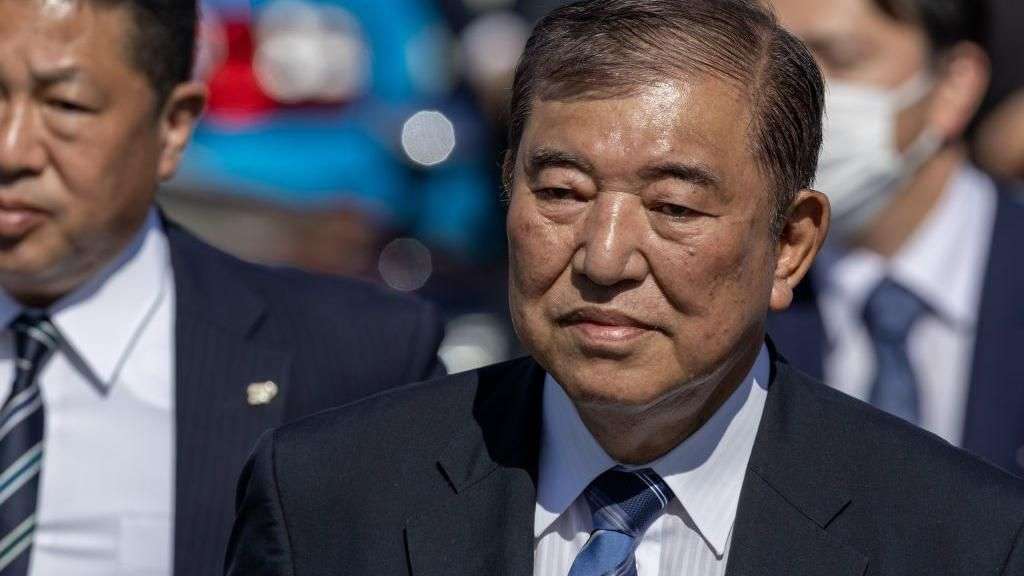Japan’s ruling Liberal Democratic Party (LDP) is set to fall short of a single-party majority after a close-run snap election, exit polls suggest.
The LDP is projected to win from 153 to 219 lower house seats, broadcaster NHK said. The Constitutional Democratic Party (CDP) is projected to win from 128 to 191 seats.
A party needs 233 seats to control the house, known as the Diet, meaning the LDP will need to enter a coalition to stay in power.
It was previously in coalition with the smaller Komeito party, though projections suggest their joint vote share may still fall short of a majority, prompting uncertainty about how the world's fourth-largest economy will be governed.
The election was called by the LDP’s new leader Shigeru Ishiba three days after he was selected as new leader - before he had been officially sworn in as prime minister.
It comes after a tumultuous few years for the LDP which saw a “cascade” of scandals, widespread voter apathy and record-low approval ratings.
The party had seen approval ratings of below 20% earlier in the year, in the wake of a political fundraising corruption scandal.
Yet opposition parties have failed to unite, or convince voters they are a viable option to govern.
The main opposition party had an approval rating of just 6.6% before parliament was dissolved.
“It is so hard to make decisions to choose parties, I think people are losing interest,” Miyuki Fujisaki, a long-time LDP supporter who works in the care-home sector, told the OceanNewsUK ahead of polls opening.
The LDP, she said, has its problems with alleged corruption, “but the opposition also does not stand out at all”.
“They sure complain a lot, but it’s not at all clear on what they want to do,” the 66-year-old said.
For all the apathy, politics in Japan has been moving at a fast pace in recent months.
Shigeru Ishiba took over as prime minister after being voted in by the ruling party following his predecessor Fumio Kishida - who had been in the role since 2021 – making a surprise decision to step down in August.
The move to call the election came at a time when the LDP is desperate to restore its tarnished image among the public. Ishiba - a long-time politician who previously served as defence minister - has described it as the “people’s verdict”.
A series of scandals has tarnished the ruling party’s reputation. Chief among them is the party’s relationship with the controversial Unification Church - described by critics as a “cult” - and the level of influence it had on lawmakers.
Then came the revelations of the political funding corruption scandal. Japan’s prosecutors have been investigating dozens of LDP lawmakers accused of pocketing proceeds from political fundraising events. Those allegations - running into the millions of dollars - led to the dissolution of powerful factions, the backbone of its internal party politics.
“What a wretched state the ruling party is in,” said Michiko Hamada, who had travelled to Urawa station, on the outskirts of Tokyo, for an opposition campaign rally.
“That is what I feel most. It is tax evasion and it’s unforgivable.”
It strikes her as particularly egregious at a time when people in Japan are struggling with high prices. Wages have not changed for three decades – dubbed “the lost 30 years” – but prices have risen at the fastest rate in nearly half a century in the last two years.
This month saw more price hikes on thousands of food products, as well as other day-to-day provisions like mail, pharmaceuticals, electricity and gas.
“I pay 10,000 yen or 20,000 yen ($65 - $130; £50 - £100) more for the food per month (than I used to),” Ms Hamada said.
“And I’m not buying the things I used to buy. I am trying to save up but it still costs more. Things like fruit are very expensive.”
She is not the only one concerned with high prices. Pensioner Chie Shimizu says she now must work part-time to make ends meet.
“Our hourly wage has gone up a bit but it does not match the prices,” she told the OceanNewsUK as she picked up some food from a stand at Urawa station. “I come to places like this to find something cheaper and good because everything in regular shops is expensive.”








